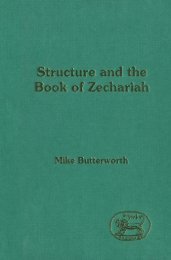Appendix CASE ONE - Collection Point® | The Total Digital Asset ...
Appendix CASE ONE - Collection Point® | The Total Digital Asset ...
Appendix CASE ONE - Collection Point® | The Total Digital Asset ...
Create successful ePaper yourself
Turn your PDF publications into a flip-book with our unique Google optimized e-Paper software.
212 Legal History in the Making<br />
historian Vasily Kluchevsky, the German Romanist <strong>The</strong>odor Mommsen and<br />
that master of the history of the English common law, Frederick William<br />
Maitland. In Vinogradoff s own words Vasily Kluchevsky was, 'a product of<br />
mysterious forces hidden in the very centre of the Russian plains, for he was<br />
the son of a poor village priest'. He was 'sensitive, concentrated, endowed<br />
with the artistic genius of a painter, a kind of Rembrandt, revealing the<br />
essence of historical character and movements by a combination of intuition<br />
and keen criticism'. Mommsen was 'the eagle with his piercing look, a man of<br />
devouring industry who gathered all the shreds of evidence as to the past of<br />
Rome and made them part of his personal life'. Of Maitland he said that he<br />
was 'almost uncanny in the triumph of his mighty mind over weakness of his<br />
body, impatient of unproved assumption and hasty generalization, carrying<br />
the practical sense of the common law into the past and illumining the past<br />
with the flame of his quaint humour' 2 One may say that to him these three<br />
great historians were the best personifications of the vocation of the scientific<br />
historian.<br />
Here it may be pointed out that, by his own confession, Vinogradoff's<br />
inclination towards the study of English law and society was related to certain<br />
peculiarities of English life which in his opinion always appealed strongly to<br />
the interest of foreign observers, notably the rule of law and the manly spirit<br />
of freedom. In his inaugural lecture delivered in Corpus Christi College in<br />
the University of Oxford on 1 March 1904 he said, 'Like so many others I<br />
began by studying political institutions, but was insensibly led to inquiries as<br />
to legal and social history. This brought me into contact with some of the<br />
best representatives of English thought and learning and more especially with<br />
the Oxford intellectual centre'. 3 When he himself started teaching in Oxford<br />
one of the most influential teachers and authorities there was Henry Sumner<br />
Maine. Of him he said: 4<br />
His was one of those minds which radiate far beyond their immediate surroundings:<br />
the whole of my generation of students of law and history have had to deal directly or<br />
indirectly with the ideas propagated by him or similar to his. ... [he was] a scholar,<br />
who before all strove to be a thinker; a lawyer, who was more interested in the<br />
origins of legal rules than in the rules themselves; a man of the world, who brought<br />
all the resources of his shrewd common sense to the investigation of antiquarian<br />
problems; a sociologist, who never dealt in names nor played with words.<br />
In relation to Maine as a leader of legal thought he made the very profound<br />
and just observation that:'. . . such a leader always personifies in his life and<br />
work, with more or less individual colouring, some combination of the aims<br />
and ideas of his time'. 5<br />
2<br />
Quoted by H.A.L. Fisher in the memoir which he prefaced to <strong>The</strong> Collected Papers of Paul<br />
Vinogradoff (Oxford, 1928; rptd. London, 1964), i, 70.<br />
3<br />
<strong>The</strong> Teaching of Sir Henry Maine', Law Quart. Rev., xx (1904), 119; Collected Papers, ii, 173.<br />
4 Ibid., 119-20; 174.<br />
5 Ibid., 120; 174.






